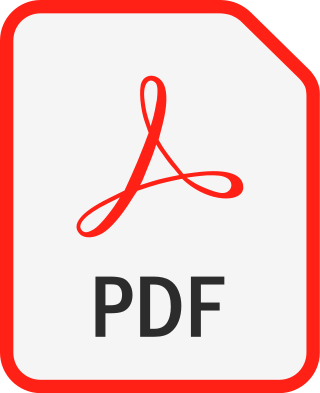
Portable Document Format (PDF), standardized as ISO 32000, is a file format developed by Adobe in 1992 to present documents, including text formatting and images, in a manner independent of application software, hardware, and operating systems. Based on the PostScript language, each PDF file encapsulates a complete description of a fixed-layout flat document, including the text, fonts, vector graphics, raster images and other information needed to display it. PDF has its roots in "The Camelot Project" initiated by Adobe co-founder John Warnock in 1991.
Scalable Vector Graphics (SVG) is an XML-based vector image format for defining two-dimensional graphics, having support for interactivity and animation. The SVG specification is an open standard developed by the World Wide Web Consortium since 1999.
Desktop publishing (DTP) is the creation of documents using page layout software on a personal ("desktop") computer. It was first used almost exclusively for print publications, but now it also assists in the creation of various forms of online content. Desktop publishing software can generate layouts and produce typographic-quality text and images comparable to traditional typography and printing. Desktop publishing is also the main reference for digital typography. This technology allows individuals, businesses, and other organizations to self-publish a wide variety of content, from menus to magazines to books, without the expense of commercial printing.
FF, Ff, fF or ff may refer to:

Computer and Video Games was a UK-based video game magazine, published in its original form between 1981 and 2004. Its offshoot website was launched in 1999 and closed in February 2015. CVG was the longest-running video game media brand in the world.

FontForge is a FOSS font editor which supports many common font formats. Developed primarily by George Williams until 2012, FontForge is free software and is distributed under a mix of the GNU General Public License Version 3 and the 3-clause BSD license. It is available for operating systems including Linux, Windows, and macOS, and is localized into 12 languages.
Embedded OpenType (EOT) fonts are a compact form of OpenType fonts designed by Microsoft for use as embedded fonts on web pages. These files use the extension .eot. They are supported only by Microsoft Internet Explorer, as opposed to competing WOFF files.
Bitstream Font Fusion is a small, fast, object-oriented font engine written in ANSI C capable of rendering high-quality text on any platform, any device, and at any resolution. The entire source code is portable, optimized, and executes independent of operating system and processor. The font engine is capable of rendering 2,400-3,300 characters per second on a 100 MIPS CPU.

Panorama is a line layout and text composition engine to render text in various worldwide languages made by Bitstream Inc. Panorama uses Font Fusion as the base to support rendering of the text. The engine allows the user to manage different text formatting aspects like spacing, alignment, style effects.

Web typography is the use of fonts on the World Wide Web. When HTML was first created, font faces and styles were controlled exclusively by the settings of each web browser. There was no mechanism for individual Web pages to control font display until Netscape introduced the font element in 1995, which was then standardized in the HTML 3.2 specification. However, the font specified by the font element had to be installed on the user's computer or a fallback font, such as a browser's default sans-serif or monospace font, would be used. The first Cascading Style Sheets specification was published in 1996 and provided the same capabilities.
FontShop International was an international manufacturer of digital typefaces (fonts), based in Berlin. It was one of the largest digital type foundries.
SFNT is a font file format which can contain other fonts, such as PostScript, TrueType, OpenType, Web Open Font Format (WOFF) fonts and other. SFNT stands for spline font or scalable font, and was originally developed for TrueType fonts on the Macintosh and used by Apple Computer's QuickDraw. SFNT was named after the resource tag the Macintosh used internally to track font data.
The Web Open Font Format (WOFF) is a font format for use in web pages. WOFF files are OpenType or TrueType fonts, with format-specific compression applied and additional XML metadata added. The two primary goals are first to distinguish font files intended for use as web fonts from fonts files intended for use in desktop applications via local installation, and second to reduce web font latency when fonts are transferred from a server to a client over a network connection.
Gothic or Gothics may refer to:

Zopfli is a data compression library that performs Deflate, gzip and zlib data encoding. It achieves higher compression ratios than mainstream Deflate and zlib implementations at the cost of being slower. Google first released Zopfli in February 2013 under the terms of Apache License 2.0.
Brotli is a lossless data compression algorithm developed by Google. It uses a combination of the general-purpose LZ77 lossless compression algorithm, Huffman coding and 2nd-order context modelling.
This page is based on this
Wikipedia article Text is available under the
CC BY-SA 4.0 license; additional terms may apply.
Images, videos and audio are available under their respective licenses.




